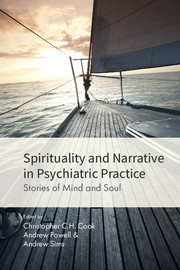Book contents
- Frontmatter
- Contents
- List of contributors
- Foreword
- Preface
- 1 Narrative in psychiatry, theology and spirituality
- 2 Spirituality and transcultural narratives
- 3 Psychopathology and the clinical story
- 4 Helping patients tell their story: narratives of body, mind and soul
- 5 Gods lost and found: spiritual coping in clinical practice
- 6 Stories of joy and sorrow: spirituality and affective disorder
- 7 Stories of fear: spirituality and anxiety disorders
- 8 Stories of transgression: narrative therapy with offenders
- 9 Narratives of transformation in psychosis
- 10 My story: a spiritual narrative
- 11 God's story revealed in the human story
- 12 Meaning without ‘believing’: attachment theory, mentalisation and the spiritual dimension of analytical psychotherapy
- 13 Stories of living with loss: spirituality and ageing
- 14 Beginnings and endings
- Index
2 - Spirituality and transcultural narratives
Published online by Cambridge University Press: 02 January 2018
- Frontmatter
- Contents
- List of contributors
- Foreword
- Preface
- 1 Narrative in psychiatry, theology and spirituality
- 2 Spirituality and transcultural narratives
- 3 Psychopathology and the clinical story
- 4 Helping patients tell their story: narratives of body, mind and soul
- 5 Gods lost and found: spiritual coping in clinical practice
- 6 Stories of joy and sorrow: spirituality and affective disorder
- 7 Stories of fear: spirituality and anxiety disorders
- 8 Stories of transgression: narrative therapy with offenders
- 9 Narratives of transformation in psychosis
- 10 My story: a spiritual narrative
- 11 God's story revealed in the human story
- 12 Meaning without ‘believing’: attachment theory, mentalisation and the spiritual dimension of analytical psychotherapy
- 13 Stories of living with loss: spirituality and ageing
- 14 Beginnings and endings
- Index
Summary
‘Once the patient's biography becomes part of the care, the possibility that therapy will dehumanise the patient, stripping him of what is unique to his illness experience becomes much less likely’ (Kleinman, 1988: p. 237).
In this chapter I shall examine transcultural (including religious) narratives of mental illness. I will illustrate my arguments through a number of narrative case studies deriving from my work as a cultural psychiatrist in London (the cases have been modified to maintain anonymity). I shall discuss the clinical implications of eliciting cultural narratives and the ways in which culturally sensitive clinicians can reconcile cultural/spiritual and biomedical narratives and the role of religious professionals in this process.
Cross-cultural narratives of mental illness
While anthropologists continue to argue over the meaning of the term ‘culture’, it broadly refers to the shared beliefs and social practices of a specific group of people. Larkey & Hecht (2010) note that the content and delivery of narratives (including conversation, stories, written words, etc.) enact identities and weave together a set of beliefs, norms and values that reflect the culture within which they reside. Stories always have a ‘cultural locus’ (Denzin, 1989: p. 73), without reference to which they cannot be understood. They incorporate themes, symbols, metaphors and causal attributions which can be understood in a culturally specific way, and which shape the lived experience of illness through the embodiment of cultural meanings.
There are anthropological studies that explore narratives of mental illness in non-Western cultures illustrating the ways in which symbols, metaphors and experiences typically ‘run together’ for the members of a society. One such example is by Good (1977), who examined ‘heart distress’ in Iran. People who had experienced adverse life events typically reported sensations of their heart pounding, quivering or feeling ‘pressed’. The emphasis on the heart derives from Galenic/Islamic medicine, which is popular in Iran and considers the heart an organ of affect rather than as a means of circulation of blood. These sensations are often closely tied to affective symptoms, including anxiety and sadness, and feelings of being trapped.
- Type
- Chapter
- Information
- Spirituality and Narrative in Psychiatric Practice , pp. 14 - 24Publisher: Royal College of PsychiatristsPrint publication year: 2016

